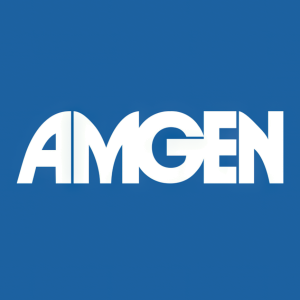LANDMARK PHASE 3 TRIAL (VESALIUS-CV) MEETS PRIMARY ENDPOINTS IN A CARDIOVASCULAR PRIMARY PREVENTION STUDY OF 12,000 PATIENTS
Rhea-AI Summary
Amgen (NASDAQ:AMGN) announced groundbreaking results from its Phase 3 VESALIUS-CV clinical trial for Repatha (evolocumab). The study met its dual primary endpoints, demonstrating significant cardiovascular event risk reduction in patients without prior heart attack or stroke history.
The landmark trial involved over 12,000 high-risk patients, with 85% on high-intensity or moderate LDL-C reducing therapy, followed for approximately 4.5 years. Repatha becomes the first and only PCSK9 inhibitor to show significant cardiovascular event reduction in both primary and secondary prevention.
This breakthrough follows Repatha's 2015 approval and successful use by over 6.7 million patients globally. The FDA recently expanded Repatha's approved use for adults at increased risk of major adverse cardiovascular events due to uncontrolled LDL-C.
Positive
- First PCSK9 inhibitor to demonstrate cardiovascular event reduction in both primary and secondary prevention
- Met dual primary endpoints with statistically and clinically significant results
- No new safety signals observed in the trial
- FDA recently expanded approved use to broader patient population
- Potential to reach tens of millions more patients earlier in treatment
Negative
- 80% of high CV risk patients without prior heart attack/stroke not reaching recommended LDL-C levels after one year
News Market Reaction
On the day this news was published, AMGN declined 0.37%, reflecting a mild negative market reaction.
Data tracked by StockTitan Argus on the day of publication.
Adding Repatha to Standard Therapy of Statins or Other LDL-C Lowering Treatments Significantly Reduces Cardiovascular Events Compared with Standard Therapy Alone
Repatha is Now the First and Only PCSK9 Inhibitor to Demonstrate Significant Reduction of Cardiovascular Events as Both Primary and Secondary Prevention
Cardiovascular disease remains the leading cause of death worldwide. In 2017, the FOURIER study proved that Repatha reduced the risk of major cardiovascular (CV) events in people with established atherosclerotic disease (ASCVD) and a history of major cardiovascular events, such as heart attack or stroke. The VESALIUS-CV study was initiated to determine if Repatha could also reduce CV events in people without a history of heart attack or stroke. VESALIUS-CV now establishes that Repatha, added to statins or other LDL-C lowering treatments, significantly reduces cardiovascular events compared with standard therapy alone as primary prevention.
The VESALIUS-CV primary endpoints were time to first occurrence of a composite of coronary heart disease (CHD) death, heart attack or ischemic stroke as well as time to first occurrence of a composite of CHD death, heart attack, ischemic stroke or any ischemia-driven arterial revascularization. The results show that the primary endpoints were both statistically and clinically significant. No new safety signals were observed.
"These results mark an important milestone in the fight against cardiovascular disease, the leading cause of death worldwide. The benefit across endpoints and established safety profile underscore Repatha's role as a cornerstone therapy in comprehensive lipid management," said Jay Bradner, M.D., executive vice president of Research and Development at Amgen. "Repatha is known as a highly effective LDL-C lowering treatment and is now the first and only PCSK9 inhibitor shown to reduce cardiovascular events in high-risk adults without prior heart attack or stroke. These additional data demonstrate that Repatha has the potential to reach tens of millions more patients earlier in their journey, before a life-altering event occurs."
Full results from the trial will be presented at the American Heart Association Scientific Sessions on Nov. 8 as part of the session "Groundbreaking Trials in Cardiometabolic Therapeutics," and will be submitted for publication in a peer-reviewed journal.
Every 40 seconds, a heart attack or stroke occurs in the
Repatha was first approved in 2015 and has since been used by more than 6.7 million patients globally.4,5 Repatha is the most extensively studied PCSK9 inhibitor, with clinical and real-world evidence across diverse populations and CV risk profiles.6
Earlier this year, the
About the VESALIUS-CV Trial
VESALIUS-CV is a Phase 3, double-blind, randomized, placebo-controlled global clinical trial designed to evaluate the impact of LDL-C lowering with evolocumab on MACE in adults at high CV risk without prior heart attack or stroke.
VESALIUS-CV enrolled more than 12,000 patients with known atherosclerotic cardiovascular disease (ASCVD) or high-risk diabetes, who had no history of heart attack or stroke, an LDL-C ≥ 90 mg/dL, or non-high-density lipoprotein cholesterol (non-HDL-C) ≥ 120 mg/dL, or apolipoprotein B ≥ 80 mg/dL; and treated with optimized lipid-lowering therapy. Participants were randomized to receive Repatha or placebo in addition to optimized lipid-lowering therapy and were followed for a median of approximately 4.5 years.
Amgen's Commitment to Cardiovascular Innovation
Cardiovascular disease (CVD) remains a major global health threat, linked to multiple interrelated risk factors like high LDL-C, Lp(a), obesity, diabetes and hypertension.7,8 These risks often coexist and require a comprehensive approach to prevention and care. Amgen is taking bold action, building on decades of leadership in CVD through LDL-C management to advance additional innovative, investigational treatments in the pipeline targeting common drivers of CVD. By combining scientific innovation with strategic partnerships to drive earlier testing, better care and broader access, Amgen's efforts reflect a sustained commitment to advancing both the science and the system of CV care.
About Repatha
Repatha is a human monoclonal antibody that inhibits proprotein convertase subtilisin/kexin type 9 (PCSK9). Repatha binds to PCSK9 and inhibits circulating PCSK9 from binding to the low-density lipoprotein (LDL) receptor (LDLR), preventing PCSK9-mediated LDLR degradation and permitting LDLR to recycle back to the liver cell surface. By inhibiting the binding of PCSK9 to LDLR, Repatha increases the number of LDLRs available to clear LDL from the blood, thereby lowering LDL-C levels.
The clinical benefits and safety of Repatha have been studied for 15 years in 51 clinical trials with over 57,000 patients.9,10 Repatha is approved in 74 countries, including the
INDICATIONS
Repatha is a PCSK9 (proprotein convertase subtilisin/kexin type 9) inhibitor indicated:
- To reduce the risk of major adverse cardiovascular (CV) events (CV death, myocardial infarction, stroke, unstable angina requiring hospitalization, or coronary revascularization) in adults at increased risk for these events.
- As an adjunct to diet and exercise to reduce low-density lipoprotein cholesterol (LDL-C) in:
- adults with hypercholesterolemia.
- adults and pediatric patients aged 10 years and older with heterozygous familial hypercholesterolemia (HeFH).
- adults and pediatric patients aged 10 years and older with homozygous familial hypercholesterolemia (HoFH).
The safety and effectiveness of Repatha® have not been established in pediatric patients with HeFH or HoFH who are younger than 10 years old or in pediatric patients with other types of hyperlipidemia. For full prescribing information, visit www.Repatha.com.
IMPORTANT SAFETY INFORMATION
- Contraindication: Repatha® is contraindicated in patients with a history of a serious hypersensitivity reaction to evolocumab or any of the excipients in Repatha®. Serious hypersensitivity reactions including angioedema have occurred in patients treated with Repatha®.
- Hypersensitivity Reactions: Hypersensitivity reactions, including angioedema, have been reported in patients treated with Repatha®. If signs or symptoms of serious hypersensitivity reactions occur, discontinue treatment with Repatha®, treat according to the standard of care, and monitor until signs and symptoms resolve.
- Adverse Reactions in Adults with Primary Hyperlipidemia: The most common adverse reactions (>
5% of patients treated with Repatha® and more frequently than placebo) were: nasopharyngitis, upper respiratory tract infection, influenza, back pain, and injection site reactions.
From a pool of the 52-week trial and seven 12-week trials: Local injection site reactions occurred in3.2% and3.0% of Repatha®-treated and placebo-treated patients, respectively. The most common injection site reactions were erythema, pain, and bruising. Hypersensitivity reactions occurred in5.1% and4.7% of Repatha®-treated and placebo-treated patients, respectively. The most common hypersensitivity reactions were rash (1.0% versus0.5% for Repatha® and placebo, respectively), eczema (0.4% versus0.2% ), erythema (0.4% versus0.2% ), and urticaria (0.4% versus0.1% ). - Adverse Reactions in the Cardiovascular Outcomes Trial: The most common adverse reactions (>
5% of patients treated with Repatha® and more frequently than placebo) were: diabetes mellitus (8.8% Repatha®,8.2% placebo), nasopharyngitis (7.8% Repatha®,7.4% placebo), and upper respiratory tract infection (5.1% Repatha®,4.8% placebo).
Among the 16,676 patients without diabetes mellitus at baseline, the incidence of new-onset diabetes mellitus during the trial was8.1% in patients treated with Repatha® compared with7.7% in patients that received placebo. - Adverse Reactions in Pediatric Patients with HeFH: The most common adverse reactions (>
5% of patients treated with Repatha® and more frequently than placebo) were: nasopharyngitis, headache, oropharyngeal pain, influenza, and upper respiratory tract infection. - Adverse Reactions in Adults and Pediatric Patients with HoFH: In a 12-week study in 49 patients, the adverse reactions that occurred in at least two patients treated with Repatha® and more frequently than placebo were: upper respiratory tract infection, influenza, gastroenteritis, and nasopharyngitis. In an open-label extension study in 106 patients, including 14 pediatric patients, no new adverse reactions were observed.
- Immunogenicity: Repatha® is a human monoclonal antibody. As with all therapeutic proteins, there is potential for immunogenicity with Repatha®.
Please see full Prescribing Information.
About Amgen
Amgen discovers, develops, manufactures and delivers innovative medicines to help millions of patients in their fight against some of the world's toughest diseases. More than 40 years ago, Amgen helped to establish the biotechnology industry and remains on the cutting-edge of innovation, using technology and human genetic data to push beyond what's known today. Amgen is advancing a broad and deep pipeline that builds on its existing portfolio of medicines to treat cancer, heart disease, osteoporosis, inflammatory diseases and rare diseases.
In 2024, Amgen was named one of the "World's Most Innovative Companies" by Fast Company and one of "America's Best Large Employers" by Forbes, among other external recognitions. Amgen is one of the 30 companies that comprise the Dow Jones Industrial Average®, and it is also part of the Nasdaq-100 Index®, which includes the largest and most innovative non-financial companies listed on the Nasdaq Stock Market based on market capitalization.
For more information, visit Amgen.com and follow Amgen on X, LinkedIn, Instagram, YouTube and Threads.
Forward-Looking Statements
This news release contains forward-looking statements that are based on the current expectations and beliefs of Amgen. All statements, other than statements of historical fact, are statements that could be deemed forward-looking statements, including any statements on the outcome, benefits and synergies of collaborations, or potential collaborations, with any other company (including BeOne Medicines Ltd. or Kyowa Kirin Co., Ltd.), the performance of Otezla® (apremilast), our acquisitions of ChemoCentryx, Inc. or Horizon Therapeutics plc (including the prospective performance and outlook of Horizon's business, performance and opportunities, and any potential strategic benefits, synergies or opportunities expected as a result of such acquisition), as well as estimates of revenues, operating margins, capital expenditures, cash, other financial metrics, expected legal, arbitration, political, regulatory or clinical results or practices, customer and prescriber patterns or practices, reimbursement activities and outcomes, effects of pandemics or other widespread health problems on our business, outcomes, progress, and other such estimates and results. Forward-looking statements involve significant risks and uncertainties, including those discussed below and more fully described in the Securities and Exchange Commission reports filed by Amgen, including our most recent annual report on Form 10-K and any subsequent periodic reports on Form 10-Q and current reports on Form 8-K. Unless otherwise noted, Amgen is providing this information as of the date of this news release and does not undertake any obligation to update any forward-looking statements contained in this document as a result of new information, future events or otherwise.
No forward-looking statement can be guaranteed and actual results may differ materially from those we project. Discovery or identification of new product candidates or development of new indications for existing products cannot be guaranteed and movement from concept to product is uncertain; consequently, there can be no guarantee that any particular product candidate or development of a new indication for an existing product will be successful and become a commercial product. Further, preclinical results do not guarantee safe and effective performance of product candidates in humans. The complexity of the human body cannot be perfectly, or sometimes, even adequately modeled by computer or cell culture systems or animal models. The length of time that it takes for us to complete clinical trials and obtain regulatory approval for product marketing has in the past varied and we expect similar variability in the future. Even when clinical trials are successful, regulatory authorities may question the sufficiency for approval of the trial endpoints we have selected. We develop product candidates internally and through licensing collaborations, partnerships and joint ventures. Product candidates that are derived from relationships may be subject to disputes between the parties or may prove to be not as effective or as safe as we may have believed at the time of entering into such relationship. Also, we or others could identify safety, side effects or manufacturing problems with our products, including our devices, after they are on the market.
Our results may be affected by our ability to successfully market both new and existing products domestically and internationally, clinical and regulatory developments involving current and future products, sales growth of recently launched products, competition from other products including biosimilars, difficulties or delays in manufacturing our products and global economic conditions, including those resulting from geopolitical relations and government actions. In addition, sales of our products are affected by pricing pressure, political and public scrutiny and reimbursement policies imposed by third-party payers, including governments, private insurance plans and managed care providers and may be affected by regulatory, clinical and guideline developments and domestic and international trends toward managed care and healthcare cost containment. Furthermore, our research, testing, pricing, marketing and other operations are subject to extensive regulation by domestic and foreign government regulatory authorities. Our business may be impacted by government investigations, litigation and product liability claims. In addition, our business may be impacted by the adoption of new tax legislation or exposure to additional tax liabilities. Further, while we routinely obtain patents for our products and technology, the protection offered by our patents and patent applications may be challenged, invalidated or circumvented by our competitors, or we may fail to prevail in present and future intellectual property litigation. We perform a substantial amount of our commercial manufacturing activities at a few key facilities, including in Puerto Rico, and also depend on third parties for a portion of our manufacturing activities, and limits on supply may constrain sales of certain of our current products and product candidate development. An outbreak of disease or similar public health threat, and the public and governmental effort to mitigate against the spread of such disease, could have a significant adverse effect on the supply of materials for our manufacturing activities, the distribution of our products, the commercialization of our product candidates, and our clinical trial operations, and any such events may have a material adverse effect on our product development, product sales, business and results of operations. We rely on collaborations with third parties for the development of some of our product candidates and for the commercialization and sales of some of our commercial products. In addition, we compete with other companies with respect to many of our marketed products as well as for the discovery and development of new products. Further, some raw materials, medical devices and component parts for our products are supplied by sole third-party suppliers. Certain of our distributors, customers and payers have substantial purchasing leverage in their dealings with us. The discovery of significant problems with a product similar to one of our products that implicate an entire class of products could have a material adverse effect on sales of the affected products and on our business and results of operations. Our efforts to collaborate with or acquire other companies, products or technology, and to integrate the operations of companies or to support the products or technology we have acquired, may not be successful. There can be no guarantee that we will be able to realize any of the strategic benefits, synergies or opportunities arising from the Horizon acquisition, and such benefits, synergies or opportunities may take longer to realize than expected. We may not be able to successfully integrate Horizon, and such integration may take longer, be more difficult or cost more than expected. A breakdown, cyberattack or information security breach of our information technology systems could compromise the confidentiality, integrity and availability of our systems and our data. Our stock price is volatile and may be affected by a number of events. Our business and operations may be negatively affected by the failure, or perceived failure, of achieving our sustainability objectives. The effects of global climate change and related natural disasters could negatively affect our business and operations. Global economic conditions may magnify certain risks that affect our business. Our business performance could affect or limit the ability of our Board of Directors to declare a dividend or our ability to pay a dividend or repurchase our common stock. We may not be able to access the capital and credit markets on terms that are favorable to us, or at all.
Any scientific information discussed in this news release relating to new indications for our products is preliminary and investigative and is not part of the labeling approved by the
CONTACT: Amgen, Thousand Oaks
Madison Howard, 773-636-4910 (media)
Elissa Snook, 609-251-1407 (media)
Adam Elinoff, 805-490-9578 (investors)
REFERENCES
- Tsao CW, Aday AW, Almarzooq ZI, et al. Heart Disease and Stroke Statistics—2023 Update: A Report From the American Heart Association. Circulation. 2023;147:e93–e621.
- Martin, S. S., Aday, A. W., Allen, N. B., Almarzooq, Z. I., Anderson, C. A. M., Arora, P., Avery, C. L., Baker-Smith, C. M., Bansal, N., Beaton, A. Z., Commodore-Mensah, Y., Currie, M. E., Elkind, M. S. V., Fan, W., Generoso, G., Gibbs, B. B., Heard, D. G., Hiremath, S., Johansen, M. C., & Kazi, D. S. (2025). 2025 Heart Disease and Stroke Statistics: A Report of US and Global Data From the American Heart Association. Circulation, 151(8). https://doi.org/10.1161/cir.0000000000001303. MAC: REF-107092
- Chan, Q, Sakhuja, S, Ochs, A. et al. JACC. 2025 REF-108811.
- Data on File; Amgen, 2025.
- Data on File; Amgen, 2025.
- Shapiro MD. Circulation. 2022;146(15):1120-1122.
- Rao SV, O'Donoghue ML, Ruel M, et al. Circulation. 2025;151(13):e771-e862.
- Vinci P, Di Girolamo FG, Panizon E, et al. Int J Environ Res Public Health. 2023;20(18):6721. Published 2023 Sep 6. doi:10.3390/ijerph2018672.
- Stein EA, Wasserman SM, Dias C, Scott R, Raal F. AMG-145. Drugs of the Future. 2013;38(7):0451.
- Data on file, Amgen. 2025.
- Data on file, Amgen. 2025.
![]() View original content to download multimedia:https://www.prnewswire.com/news-releases/landmark-phase-3-trial-vesalius-cv-meets-primary-endpoints-in-a-cardiovascular-primary-prevention-study-of-12-000-patients-302573412.html
View original content to download multimedia:https://www.prnewswire.com/news-releases/landmark-phase-3-trial-vesalius-cv-meets-primary-endpoints-in-a-cardiovascular-primary-prevention-study-of-12-000-patients-302573412.html
SOURCE Amgen








